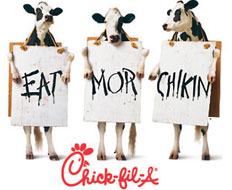Q: How can I make my limited-service restaurant a great brand?
A: Ever since I wrote my first book, What Great Brands Do: The Seven Brand-Building Principles that Separate the Best from the Rest (Jossey-Bass), people have been asking my opinion of great fast-food brands. There are a lot of them out there, and everyone has their favorites. To be as objective as possible, I look for brands that meet several criteria:
• Above-average profit margins. Profitability remains the strongest indicator of brand power, so, to the extent it’s possible to ascertain from publicly available data, I use above-average profit margins or operating profits.
• Ranked highly in surveys. Great brands must be loved by customers, so I look for brands that rank highly in consumer surveys conducted by Harris, Market Force Information, and others.
• Valuable and/or growing. Great brands should be producing consistent same-store sales and unit growth.
Underlying these brand vitality metrics is the approach to brand-building that great limited-service brands share. They use their brands the way all great brands do—as complete, strategic platforms that drive, align, and guide everything they do. They build their brands through actions, not advertising. Their brand isn’t simply an image; it’s an instrument. Brand-building isn’t just creative or strategic; it’s operational.
In my new book, Extraordinary Experiences: What Great Retail and Restaurant Brands Do, I highlight three limited-service brands (along with three retailers and one casual-dining chain) that make my “great brand” list. I carefully selected them because each exemplifies one of the brand-building principles that drive all great brands. As such, they provide helpful insights on how to make your restaurant a great brand. Here’s a quick preview:
Popeyes Louisiana Kitchen fought back from near financial bankruptcy by applying the brand-building principle “Great Brands Start Inside”—that is, great brands start building their brands by cultivating a strong brand-led culture inside their organizations. Back in 2007, Popeyes CEO Cheryl Bachelder and her team faced a long list of people unhappy with the performance of the brand, including guests, employees, franchise owners, shareholders, and board of directors members. They chose to focus on franchisees and executed the first stage of a successful turnaround by engaging with them fully and transparently.
Then, to ensure they could sustain their success, the executive team turned to the rest of the organization. They knew they needed to explain to everyone who worked on the brand why the work they were doing was important. They crafted a purpose statement—“Inspire servant leaders to achieve superior results”—and then set to the hard work of making that purpose matter.
Through leadership engagement efforts and training that gives restaurant managers resources and support to become better leaders, Popeyes has laid the foundation for continued superior customer experiences and financial performance.
The leaders at Jason’s Deli, who have run the company for 40 years with the values and principles that founder and chairman of the board Joe Tortorice Jr. established when he first started it, have embraced the brand-building principle “Great Brands Commit and Stay Committed.”
“We uncovered [our core values]; we didn’t hire a company to tell us what would be nice values to have,” Tortorice told me. “Over the years, we’ve determined that these are the values we stand for. We have preached and taught those core values throughout the system on a continuous basis.” Committing to the core of its brand, Jason’s Deli has run a “Core Values Workshop,” a two-and-a-half day program for employees and vendors. And its “Leadership Institute” offers free classes for managers on topics from money matters to marriage issues, conflict resolution, and the brand’s core values.
Jason’s Deli’s commitment to its values can also be seen in how it approaches growth. When it opens in a new market, it transplants managers from existing restaurants to ensure the culture can be quickly replicated. And unlike many franchises with aggressive growth plans, expansion is driven by personnel readiness, not market opportunity.
Sweetgreen was founded by three students in a 560-square-foot retail space, but they didn’t allow a small start to confine their big ambitions. They set out to create a brand that would make a difference by combining passion and purpose, and they operate the fast-casual chain according to the principle “Great Brands Never Have to ‘Give Back.’”
In addition to serving savory salads made of fresh, locally sourced ingredients in sustainably designed buildings, Sweetgreen hosts an annual music and lifestyle festival called Sweetlife. It also teaches thousands of elementary school students about healthy food every year to inspire kids to become “defenders of wellness.” As such, Sweetgreen is making a positive impact in the world without having to “give back.” Like other great brands, it uses its core capabilities and brand power to inspire social change.
Extraordinary Experiences digs into these and other companies to demystify the brand-building process. You might admire great brands for their bold moves and innovative approaches, but you remain unclear about what really separates good brands from those that triumph over time and achieve sustained business success. This book will give you the clarity you crave.






